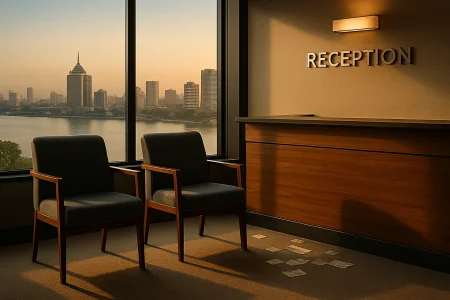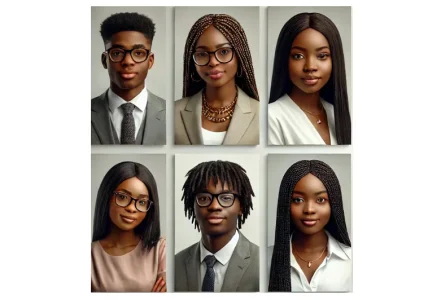
Digest: Every interaction is an invisible interview. From Teslim Balogun Stadium to Victoria Island boardrooms, Nigerians constantly form lasting impressions based on subtle signals most people never consciously recognise. Understanding these unspoken evaluations—rooted in our cultural emphasis on presentation and respect—can transform how you navigate Lagos' commercial epicentre and professional spaces nationwide.
It's 8:47 AM at Eko Atlantic's business district. Two candidates arrive for the same meeting—punctual, qualified, and wearing similar outfits. By 8:52 AM, one has unconsciously positioned oneself as the more credible professional. The difference? A collection of invisible signals that spoke before either person uttered a word.
This scenario plays out thousands of times daily across Lagos, Nigeria's commercial heartbeat, with ripple effects felt from Abuja's government corridors to Port Harcourt's industrial zones. What makes it fascinating isn't just that these snap judgments happen—it's that they're often more accurate predictors of professional success than formal qualifications.
The Two-Second Economics of First Contact
Behavioural economists discovered what most Nigerians instinctively understood: We make hiring, partnership, and collaboration decisions within seconds of meeting someone. The conscious mind spends the next several minutes constructing rational justifications for conclusions already reached.This accelerated decision-making becomes even more pronounced in Lagos' fast-paced commercial environment. With limited time and endless options, professionals develop sophisticated filtering systems. They're not being superficial—they're being efficient.
Consider the investment banker rushing between meetings in Ikoyi, the startup founder pitching in Yaba, or the oil executive networking in Victoria Island. Each interaction carries weight because Lagos professionals understand something fundamental: in a city where everyone is ambitious, the subtle differentiators matter most.
The Four Invisible Signals That Speak First
Before you introduce yourself, these silent messengers have already begun their work:Signal One:
- Physical Presence. How you occupy space communicates authority. In Nigerian business culture, confident posture signals respect for yourself and others, but there's a crucial distinction between presence and pretence.
- Attention to DetailFrom pressed clothing to polished shoes, Nigerians notice maintenance. This isn't vanity—it's evidence of systematic thinking. If you manage personal details well, you likely manage professional responsibilities similarly.
- Cultural Fluency: Understanding when to speak English, when to switch to Pidgin, and when to acknowledge hierarchy demonstrates Nigerian social intelligence—a skill more valuable than many formal qualifications.
- Energy Management Maintaining composure and freshness despite Lagos' demanding environment signals resilience. In a city that tests everyone daily, those who appear unflappable suggest deeper reserves of capability.
The Clean Slate Advantage
One universal truth about Nigerian workplace culture, from Lagos to Kaduna, from Enugu to Kano, is that cleanliness communicates competence. This isn't shallow—it's strategic. The working Nigerian understands that personal presentation, from head to toe, signals attention to detail, self-respect, and reliability.Walk through any Lagos corporate environment—from the banking halls of Marina to the tech offices of Computer Village—and you'll notice something remarkable. Professionals invest significantly in their presentation because they understand its economic value. The crisp shirt, the polished shoes, the fresh breath during close conversations aren't vanity purchases; they're professional tools.
But here's where many get it wrong: they focus on expensive items rather than consistent standards. The most successful professionals understand that excellence is reliable attention to fundamentals, not occasional luxury.
The Lagos Paradox: Why Trying Too Hard Backfires
Here's where Lagos teaches us something counterintuitive about confidence: the most assured professionals often acknowledge what they don't know. In a city built on hustle and ambition, authentic humility combined with clear competence creates a powerful combination.Many make the mistake of confusing confidence with bravado. Lagos' business culture, refined through decades of international commerce, has developed sophisticated detection systems for authenticity. Overcompensation—whether through excessive claims, flashy displays, or forced familiarity—immediately identifies someone as uncertain of their actual value.
True confidence whispers, while insecurity shouts. The professional who admits uncertainty about one area while demonstrating competence in another appears more trustworthy than someone claiming universal expertise.
The Morning Confidence Checklist
Transform these insights into daily practice with this systematic approach before important interactions:- Physical Audit (2 minutes): Check posture, ensure fresh breath, and verify clothing details are managed. Remember: Nigerians notice maintenance as evidence of systematic thinking.
- Mental Preparation (3 minutes): Identify one area where you're confident, one where you're learning. Authentic professionals acknowledge both rather than pretending perfection.
- Cultural Calibration (1 minute): Consider who you're meeting and adjust language, formality level, and interaction style accordingly. Nigerian business success requires social intelligence alongside technical skills.
- Energy Check (1 minute): Ensure you maintain professional stamina throughout the interaction. Staying fresh signals deeper capabilities in Lagos' demanding environment.
The Compound Effect of Daily Consistency
The most successful professionals in Lagos understand something others miss: excellence isn't about grand gestures—it's about consistent attention to fundamentals. The person who maintains professional standards regardless of circumstances builds a reputation that opens doors across Nigeria's interconnected business networks.This applies whether you're in Lagos' central business district or building professional relationships in other Nigerian commercial centres. The same principles that create success in Tinubu Square translate to effectiveness in Abuja's Central Business District or Kano's commercial zones.
Small, consistent choices compound over time. The professional who arrives fresh to every meeting, maintains energy throughout long days, and shows respect through attention to detail is not just succeeding in individual interactions. They're building a reputation that precedes them into every room.
Beyond the Obvious: What Really Matters
The invisible interview never ends—it just evolves. In Nigeria's competitive professional landscape, those who understand its unspoken rules don't just succeed; they create opportunities for others to follow.Your reputation becomes your greatest professional asset, built through hundreds of small interactions in which invisible signals speak louder than formal presentations.
Join the discussion: Share your observations about invisible professional signals in Nigerian workplaces. What unspoken rules have you discovered that distinguish good and great business relationships?



